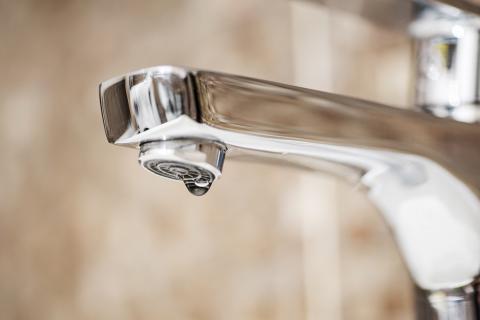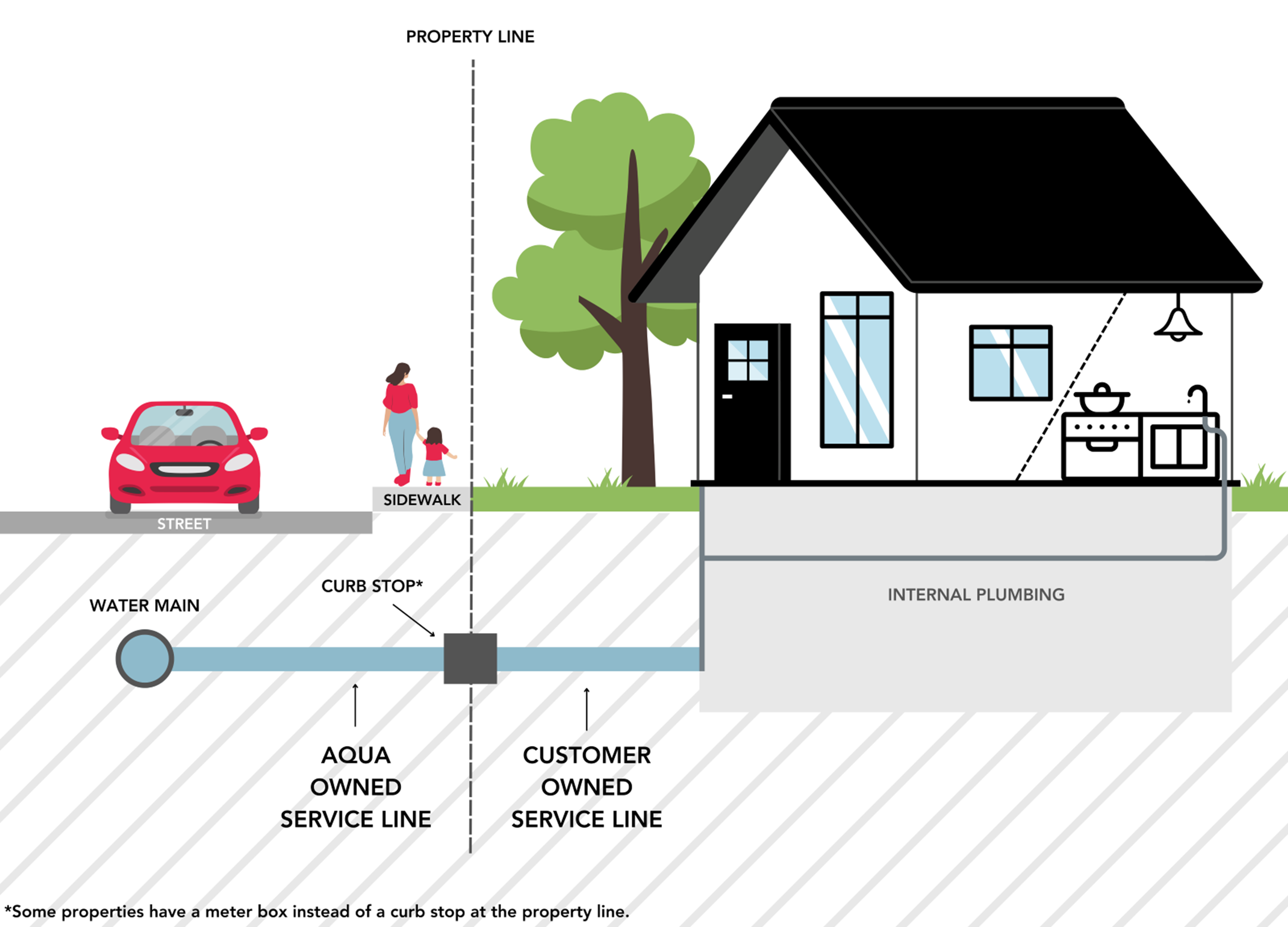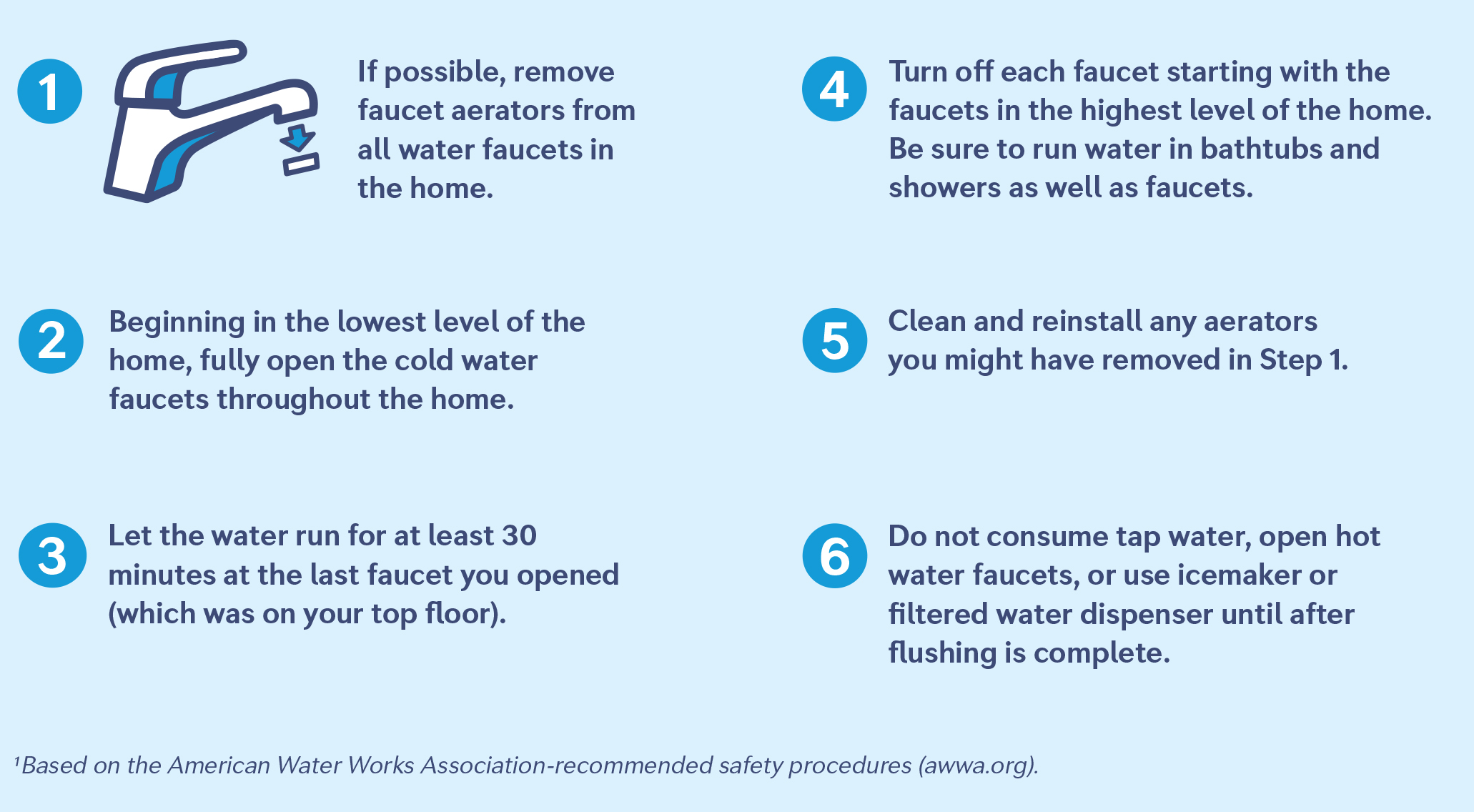Lead
What you should know about lead and drinking water.
Lead is not typically found in the streams, reservoirs or wells that serve as water supplies or in the main water lines that carry water from treatment plants to homes. Yet, the chemical properties of water can cause lead and other metals to leach into drinking water. The main source of lead in drinking water is from lead service lines (the pipes that deliver water from water mains in the street and into homes) and from typical household plumbing (lead solder and brass fixtures) that contain lead. Households that have, or suspect having, lead service lines or lead in their household plumbing are strongly encouraged to replace them. More about lead is available in our Lead Fact Sheet and throughout the page below.
More Details About Lead
Lead Fact Sheet

Sources of Lead
Lead is a common metal found in the environment. Drinking water is one possible source of lead exposure. Lead Service lines, brass faucets, fittings, and valves, including those advertised as “low lead” or “lead-free,” may contribute lead to drinking water. Regulations previously allowed “low lead” fixtures containing up to 8 percent lead. Current regulations only allow “lead-free” fixtures with up to 0.25 percent lead. When water is in contact with pipes, service lines, or plumbing that contains lead for several hours, the lead may enter drinking water. Homes built before 1990 are more likely to have lead pipes or lead solder.
The main sources of lead exposure are lead-based paint, lead-contaminated dust or soil, and some plumbing materials. In addition, lead can be found in certain types of pottery, pewter, brass fixtures, food, and cosmetics. Other sources include exposure in the workplace and exposure from certain hobbies (lead can be carried on clothing or shoes). Lead is found in some toys, some playground equipment, and some children’s metal jewelry.
The health effects of lead
Exposure to lead in drinking water can cause serious health effects in all age groups. Infants and children can have decreases in IQ and attention span. Lead exposure can lead to new learning and behavior problems or exacerbate existing learning behavior problems. The children of women who are exposed to lead before or during pregnancy can have increased risk of these adverse health effects. Adults can have increased risks of heart disease, high blood pressure, kidney, or nervous system problems.
If you are concerned about lead exposure:
- Contact your local health department or healthcare provider to find out how you can get your child tested for lead.
- Visit the EPA at EPA.gov/lead for more information on the health effects of lead or reducing lead exposure in your home.
- Call Aqua at 877.987.2782 for information about testing your water.
How Aqua protects our customers
Water utilities, including Aqua, treat drinking water to reduce the chance for metals to leach into the water. Aqua conducts required testing for drinking water contaminants, including lead and copper, to ensure compliance with state and federal drinking water standards. Aqua tests the water at our treatment plants, and also schedules customer tap sampling and tests for lead, to comply with the U.S. Environmental Protection Agency’s (EPA) lead and copper rule.
You can always view your community’s test results. They are summarized in our annual water quality reports, which are produced for every water system we own and operate.
What you can do
If your home’s water shows elevated levels of lead, or if you are concerned about the potential of lead in your water, below are ways you can minimize your exposure.
- Run your tap to flush out lead. If your water hasn’t been used for several hours, run your water for a few minutes or until it becomes cold or reaches a steady temperature before drinking or cooking.
- Use cold water to cook or prepare baby formula. Do not boil water to reduce lead. Lead dissolves more easily in hot water and boiling water will concentrate the lead.
- Do not boil water to remove lead. Boiling water will not reduce lead.
- Consider alternative sources or treatment of water. You may want to consider purchasing bottled water or a water filter. Read the package to be sure the filter is approved to reduce lead or contact NSF International (www.nsf.org) for information on performance standards for water filters. Be sure to maintain and replace a filter device in accordance with the manufacturer’s instructions to protect water quality.
- Test your water for lead. Call us at 877.987.2782 to find out how to get your water tested for lead.
What is a service line?
The service line that provides water service to a property is made up of two parts: a Company-owned portion (which connects from the Company’s main to the curb line) and a customer-owned portion (which connects from the curb line to a customer’s structure). Please see the infographic pictured below.
To find out your service line material, click here to visit our new customer service line material map.

Lead Service Line Replacement
In some states, where authorized under a state Customer Lead Service Line Replacement Program, Aqua will replace the customer-owned portion of the service line at no direct cost to the customer. You can see the Water Service Line Division of Responsibilities above or by clicking on your state below.
Learn More About Flushing Your Home
If your line was replaced as part of Aqua’s Lead Service Line Replacement Program, please flush your water before use.
To do so, please review and follow these very important instructions to minimize your exposure to metals, such as lead, which might have been stirred up due to the service-line replacement work. Please flush all your faucets using these steps:

